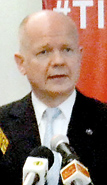News
In my country, no press was smashed, no journalist disappeared: Hague
British Foreign Secretary William Hague yesterday brushed off the suggestion that the British Government’s position on Sri Lanka is guided by close ties with the pro-LTTE Global Tamil Forum and other diaspora groups. In an exclusive interview with the Sunday Times, Mr. Hague said, “If our attitude was determined by any domestic politics, we wouldn’t have come.”

“The British Labour Party says we shouldn’t come and the easy thing to do would have been not to have come at all,” he said. “But we decided to come because we think it is right to be engaged with Sri Lanka. We think we make more impact on these issues by being here and I think that has happened with the Prime Minister’s visit to the North and the meetings we have had.”
There could be another resolution on Sri Lanka at the United Nations Human Rights Council in March if there was no progress on appointing an “independent, credible and thorough inquiry” into accusations of war crimes, Mr Hague said.
His comments are significant because Britain was on Tuesday elected as a voting member of the UNHRC. British Prime Minister David Cameron said in a news conference yesterday morning that, if an investigation was not completed by March, then he would use Britain’s position on the UNHRC to work with the Human Rights Commissioner in calling for an international inquiry.
“There was a resolution last year, of course, in the Human Rights Council,” Mr Hague said. “And given the lack of progress on this issue, members of the Human Rights Council will, I’m sure, want to return to another resolution. But this is November, that is March. In meetings here, we have been urging our Sri Lanka counterparts to recognise that and we look to them to take action on this before March.”
Mr. Hague said it was possible for the government to establish (an inquiry), “to start and show the world they are doing that”. “That would make a big difference, of course,” he stressed. “We have been elected again as a full voting member of the Human Rights Council. We will be pursuing this issue.”
On whether an independent, thorough and credible probe could be done locally, Mr. Hague said any country that sets up any inquiry must do so “in a way that commands international respect”. “We have an inquiry currently, the Chilcot Inquiry, into aspects of the Iraq war,” he observed.
When it was pointed out that the Chilcot Inquiry is currently stalled, Mr. Hague said, “Well, it will be reporting. We called for it to be set up and it will report. It exists and I think everybody can see that’s a credible and independent and thorough inquiry. That’s my point. So it’s possible for countries to do that and, in the absence of that, the pressure for an international inquiry, including at the Human Rights Council in March, will grow stronger.”

Mr. Hague said, “Some of our visiting journalists, including from Channel 4, have had some serious difficulties and we have had to take that up with the Sri Lankan Government during the visit.” Last week, the Editor’s Guild of Sri Lanka wrote to Prime Minister Cameron urging him to put a stop to the Royal Charter on press regulation over fears it would serve as a blueprint for those who want to control the press around the world.
To the question of whether Britain now had a moral right to speak about media freedom when it was taking steps towards increasing regulation of its own press, Mr. Hague replied: “People would see that Britain retains a vigorous press. In our country, there aren’t printing presses that have been smashed and there aren’t any journalists that have disappeared, so it isn’t really something with which someone can make a meaningful comparison.”
“The press comment will remain entirely free, with no intimidation, no fear of government or any other authority, in the United Kingdom,” he vowed. “So for anyone who wants to compare themselves to Britain in press freedom, let them adopt our culture of press freedom.”


